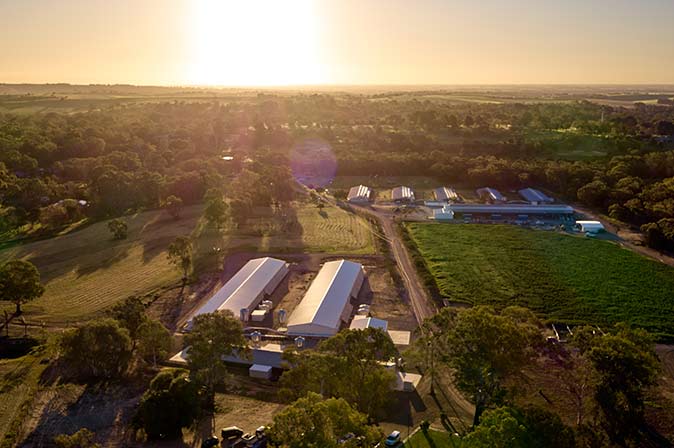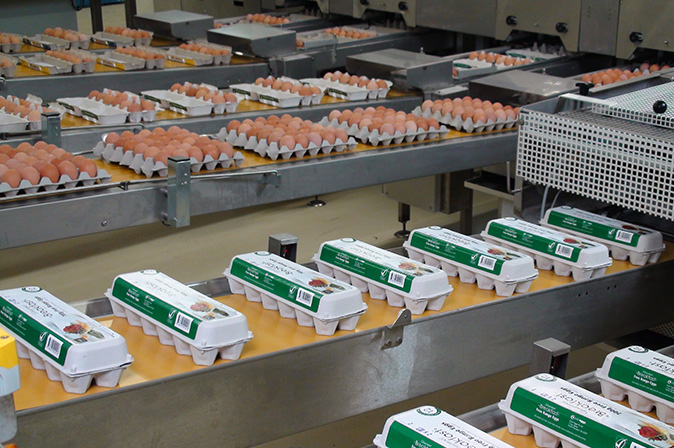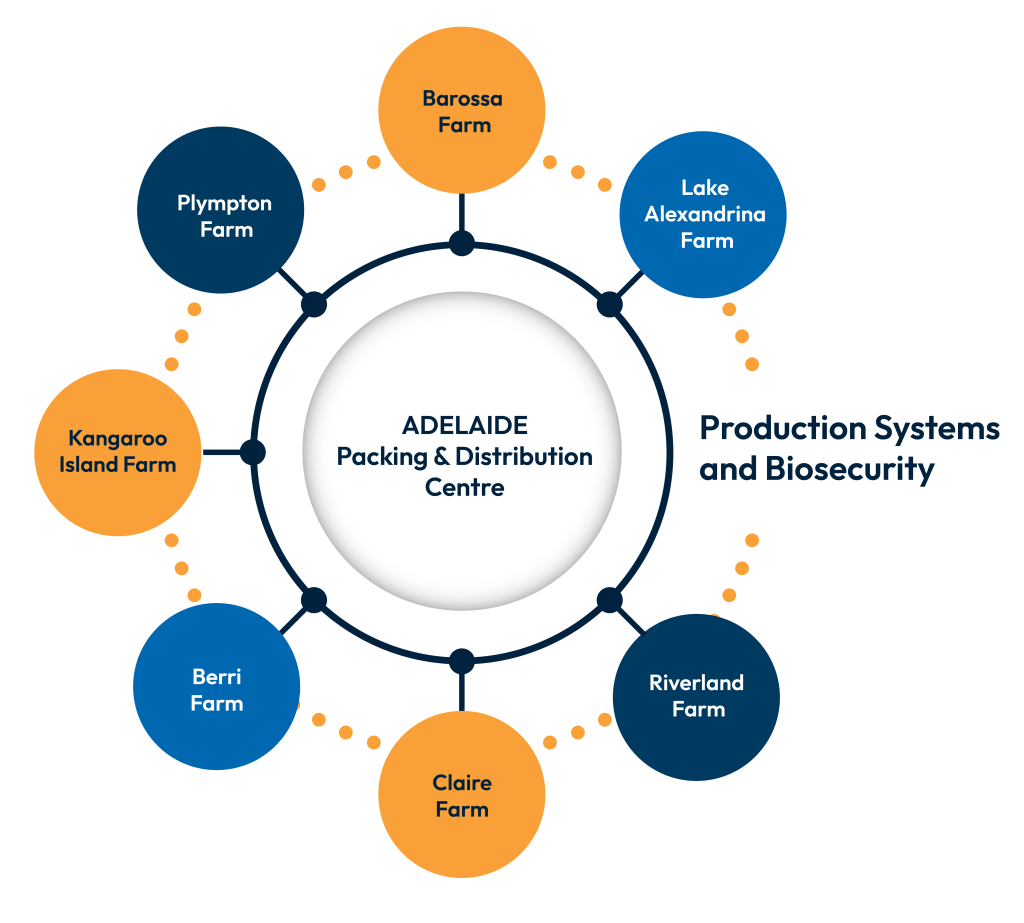Our Farms & Facilities
Our Farms
At Solar Eggs, biosecurity is a crucial part of our commitment to delivering quality eggs safely and responsibly.

Barossa Valley

Lake Alexandrina Farm

Plympton
Barossa Valley (Sandy Creek)
Nestled in the picturesque Barossa Valley, our farm spans 180 acres of pristine land, offering an ideal climate and clean, fresh air. This exceptional environment is not just beautiful—it’s perfectly suited for fostering the health and wellbeing of our hens.
With a stocking density of just 5,000 hens per hectare, our free-range paddocks provide ample space for the hens to roam, forage, and express their natural behaviors. Access to high-quality feed ensures their nutritional needs are met, supporting their health and the production of premium eggs.
Our state-of-the-art rearing sheds and facilities are designed to prioritize animal welfare and sustainability. These advanced systems provide a safe, comfortable, and nurturing space for our hens, allowing them to thrive in harmony with their surroundings.
Barossa Farm is also home to more than just hens. Alpacas and sheep share the land, playing an essential role in the ecosystem, while native fauna, such as kangaroos and birds, find sanctuary here. Together, they create a vibrant and diverse environment that reflects our commitment to sustainable and ethical farming practices.
Sustainability at Barossa Farm
At Solar Eggs, sustainability is at the core of our operations. On the Barossa farm, all manure from our sheds is collected, dried, and repurposed as fertilizer. This fertilizer is spread and cultivated into the paddocks, where seeds are planted, promoting healthy crop growth. Cropping not only reduces weed load but also enhances soil health and yields harvests like hay.
In our free-range paddocks, we plant a mix of grains such as turnips, corn, and barley, providing chickens with diverse and engaging environments to explore. These rehabilitated paddocks offer more than just dirt for the chickens to bathe and play in, encouraging natural behaviors and enhancing their overall wellbeing.
We’re proud to recycle and repurpose products generated within the farm. Wastewater is treated and used for irrigating tree plantations and fruit crops, creating additional shelter for livestock and chickens. We also rotate sheep through the paddocks, allowing the land to regenerate while benefiting from natural manure spreading.
Our commitment to renewable energy is reflected in our use of solar power. The farm is equipped with solar systems at the front and rear sections, and as we expand, we increase our solar capacity to meet growing energy demands sustainably.
Water conservation is another priority. We minimize water usage on-site by retaining and recycling stormwater, which is used for irrigation and as backup water for livestock. Our sheds are designed with sustainability in mind. They are naturally ventilated, maximizing natural light and airflow, which reduces the need for powered ventilation and artificial lighting during the day.
Feedstocks are carefully sourced from mills that adhere to the highest sustainability standards, ensuring both quality and environmental responsibility. Fuel usage is kept to a minimum, limited to essential operations like running machinery and tractors.
We’re also deeply invested in tree planting, with a program that plants approximately 2,000 trees annually. Since the farm’s establishment, we’ve planted over 25,000 trees, with plans to continue expanding this initiative at a sustainable pace.
At Solar Eggs, we’re committed to fostering a farm that not only provides for our chickens but also contributes positively to the environment and future generations.
Lake Alexandrina Farm
Solar Eggs is excited to expand operations to the recently acquired Lake Alexandrina farm. Situated near the water, this farm benefits from a naturally cooler environment, especially during the hot summer months. The coastal breezes create a more sustainable setting for the hens, reducing the need for artificial cooling systems and enhancing their overall comfort and wellbeing.
Although the site is less developed compared to our Barossa farm, we have ambitious plans to transform it into a thriving and sustainable operation. A massive tree-planting program is underway to create shaded areas, which will help cool the farm, improve the free-range paddocks, and make the hens feel more comfortable while ranging. Natural shelter fosters healthier behaviors and supports the long-term sustainability of the land.
As with all Solar Eggs farms, we’re committed to closing the loop on waste. All organic matter will be processed and returned to the land, ensuring that no waste products leave the farm. The same sustainable systems we’ve implemented at our Barossa farm—including solar power—will be introduced at Lake Alexandrina to minimize the environmental footprint and maximize energy efficiency.
This farm’s location near Lake Alexandrina is not just picturesque; it’s also practical. The proximity to water and the unique microclimate offer natural advantages, allowing us to continue delivering the highest quality eggs while caring for the land and animals.
Plympton - The Heart of Solar Eggs
Our Plympton site is more than just a facility – it’s the central hub that keeps Solar Eggs running smoothly. As the location of our original family farm, Plympton carries our history while driving our future. Here, every egg is carefully graded to meet the highest standards before making its way to homes, retailers, and businesses across the region. The site also brings together key parts of our operations – from administration and production, to pulp processing and distribution. With its blend of tradition and efficiency, Plympton is where quality, care, and commitment all come together – ensuring Solar Eggs delivers the freshest, most reliable eggs every day.
Administration - The Plympton site is home to Solar Eggs’ central administration team, coordinating everything from farm operations to distribution logistics. It’s where customer service and retailer relationships are managed, ensuring the business runs smoothly every day.
Grading - Every egg collected makes its way to Plympton to be carefully graded. Using a combination of advanced technology and hands-on oversight, each egg is checked for size, weight, and shell quality. This process ensures only the very best eggs are packed and delivered to customers.
Production - Plympton also manages the production of pure pulp. With a strong focus on food safety and compliance, the production team maintains efficiency and consistency while supporting Solar Eggs’ commitment to quality.
Distribution - As the central hub, Plympton oversees the distribution of eggs to supermarkets, retailers, businesses and international locations. Coordinated logistics and a well-managed fleet ensure deliveries are always fresh, reliable, and on time.
Protecting What Matters: Biosecurity, Sustainability, and the Environment
At Solar Eggs, biosecurity is a crucial part of our commitment to delivering quality eggs safely and responsibly. To ensure the highest level of protection, we've established a network of farms strategically positioned around Adelaide. Each farm is carefully distanced to prevent cross-contamination in the rare event of an outbreak, setting a new benchmark for safety in South Australia.
Our state-of-the-art grading and processing facility is purposefully located off-farm, a critical measure that ensures operations can continue without compromise, even during unexpected challenges.
Solar Eggs is proud to be the only producer in South Australia with this advanced level of biosecurity, sustainability, and environmental care—providing unmatched protection and reliability for our retailers and customers.

